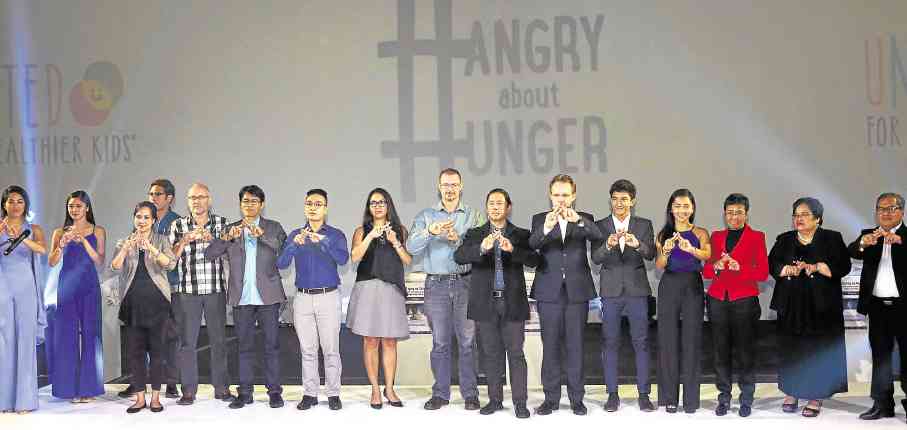
Nestlé Philippines Inc. chair and CEO Jacques Reber (6th from right) leads partners in signifying their commitment to address malnutrition among Filipino schoolchildren.
Cedrick from Legazpi City; Dexter from Cebu City; and Vanessa from Tagum City.
These three eight-year-olds were presented as the faces of United for Healthier Kids (U4HK), the advocacy program of Nestlé Philippines Inc. that aims to help solve the country’s malnutrition problem.
Started in 2014, U4HK had a recent relaunch through a forum in Makati City as Nestlé aims to further push for widespread awareness and education, as well as multisectoral collaboration among government agencies, nongovernment organizations, and private businesses, to address this issue once and for all.
“Nobody has, alone, the solution,” said Jacques Reber, Nestlé Philippines CEO and chair. “The more we put our resources together, our capabilities, the bigger will be the impact on malnutrition.”
The three kids also represented the three basic meals children from poor communities get to eat due to lack of resources: Giniling na mais (ground corn), malabnaw na lugaw (watery plain rice congee), and nilagang saba (boiled saba banana).
Guests were served such fare for dinner at the relaunch to emphasize just how lacking in nutrition marginalized children are.
According to data from the Food and Nutrition Research Institute-Department of Science and Technology (FNRI-DOST), seven million Filipino children are malnourished, classified as underweight, stunted (low height for age) or wasted (low weight for height).
“A generation of Filipino children are already hindered from reaching their full potential if they are hungry and deprived of the nutrition they need to learn in school and stay active,” said the event’s guest speaker Sen. Grace Poe, who was joined by forum panelists Mario Capanzana, FNRI-DOST director; Dr. Adela Jamorabo-Ruiz of the Nutritionist-Dieticians Association of the Philippines; Rappler CEO and executive editor Maria Ressa; and Paolo Mercado, Nestlé Philippines Inc.’s senior vice president for marketing communication and innovation.
Poe also touched on the two anti-child malnutrition bills she has filed in the Senate: Senate Bill (SB) No. 160 or the proposed Libreng Pananghalian sa Pampublikong Paaralan Act, and SB 161 or the First 1,000 Days Act.
In an earlier Inquirer report, Poe said “SB 160 seeks to institutionalize a free nutrimeals program for children enrolled in the K-12 public schools in a bid to improve their health, attendance and academic performance, while SB 161 provides maternal and child health care program in every barangay, which includes nutrition and family counseling, proper breast-feeding of children, nutritional support for pregnant and nursing mothers, treatment of malnourished children, and other timely interventions.”
In a humorous side comment on the current administration’s antidrug war, the senator, in her speech at the U4HK event, even quipped: “Pwede, extrajudicial eating na lang? Patayin ang gutom, hindi ang nagugutom.” (Could we have extrajudicial eating instead [of extrajudicial killings]? Let’s kill hunger, not the hungry.)
Which is exactly what Nestlé has set out to do by working with nine NGOs to also provide individuals volunteer and donation opportunities in the battle against hunger and malnutrition.
These NGOs are A Single Drop for Safe Water, Children’s Hour, Children’s Joy Foundation, Children’s Mission, Project Pearls, Reach Out and Feed Philippines, Red Cross Philippines, Virlanie Foundation, and Waves for Water.
People can connect to these groups via U4HK’s digital platform www.u4hk.ph. The online portal has a Volunteer section where one can find details on how to join all the U4HK activities scheduled in the next couple of months.
One could start, even, by simply sharing the hashtag, #hangryabouthunger, which essentially describes what Nestlé wants people to feel about malnutrition: Angry but inspired to actually do something about the problem.
Ultimately, U4HK is all about encouraging proper collaborations by private and public sectors to ensure that the strong economic growth the Philippines so proudly boasts of is an inclusive one, the kind that will actually trickle down to the plates of those who need it the most—such as Cedrick, Dexter and Vanessa.
“For the Philippines to combat malnutrition, we need to adopt a more systemic approach to reducing hunger. We need to bring organizations with expertise in access to food, nutrition education, water, sanitation, hygiene, nutrition in disaster,” said Reber. “We need to harness the energy and ideas of young people who have demonstrated their will and capacity to shape the Philippines into a country whose people are able to lead prosperous and healthy lives.”